Contents
Many people love the popular delicacy in America – popcorn. Everyone knows that it is made from corn. But this is not any corn, but its special varieties, which are grown according to certain rules of agricultural technology. Corn for popcorn is grown and then harvested and dried. Only then can it be used for its intended purpose.
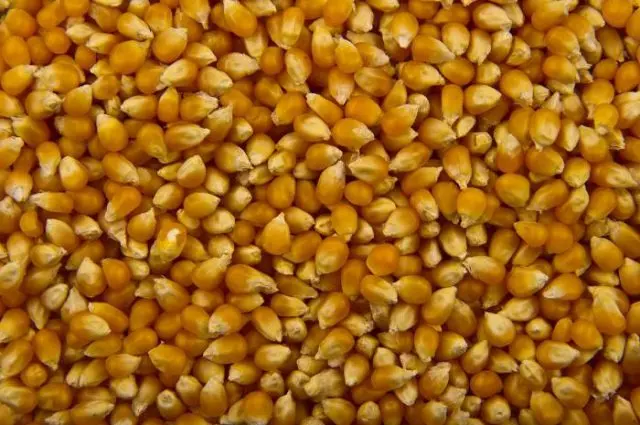
History of popcorn
According to legend, popcorn has been around since the time of the Indians. In 1630, the leader of the Kuodekuyan tribe arrived in the village of English colonists. It was there that he showed how to make popcorn, which in Indian tribes was considered not only food, but also a means for divination. In Chicago in 1886, popcorn began to be produced on an industrial scale. The standard use of this delicacy in cinemas began in 1912, when it was sold to movie lovers. Corn grains explode due to the starch inside and a small drop of water. How the Indians came up with this is still unknown. But in America there is even a special holiday called “Popcorn Day”. It is celebrated on January 22nd.
Popcorn varieties vary in name and appearance, but either way, they share traits that help the popcorn pop.
Why does corn explode
The presence of starch and water ensures that the corn “explodes” and turns into popcorn. Therefore, special varieties are required in which there is a hard and vitreous shell. During the explosion, shell residues remain on the final product. Popcorn varieties of corn have a lot of them.
The process itself occurs due to the large amount of moisture that is in the grain. If it is not enough, then moisture will not be able to break the shell. But also excess water in the grain will lead to the fact that the usual temperature is not enough for the explosion of the grain. Therefore, varieties are needed in which there is only a small drop of water. It boils under the influence of temperature and then turns into steam. It is this vapor that breaks the shell.
What kind of corn is suitable for popcorn
A suitable grain for popcorn has the following features:
- thin but strong walls;
- lacquered grain surface;
- low percentage of starch compared to other varieties of corn;
- more fat and protein.
It is these varieties that easily turn the liquid inside the grains into steam and burst under the influence of temperature in the microwave or in a frying pan.
The best varieties of corn for making popcorn
To make an airy treat, there are several proven varieties of cereal. They meet all the requirements and, with proper care, produce grains that can easily turn into popcorn under the influence of temperature. For those who want to grow such corn, you can choose varieties according to ripening time, yield, and even the color of the grains. The variety is great, you can plant and grow such varieties in your own area. With proper care and storage, these varieties of unopened grains have no more than 2%. Varieties of corn for popcorn are shown below in the photo. Some look very unusual, like the delicacy itself.
red popcorn
This is an early variety of plants with low shoots. It reaches a height of 120 cm. The cobs are small, no more than 10 cm long. The grains have an interesting color, similar in shade to mahogany. It is characterized by the highest taste qualities.
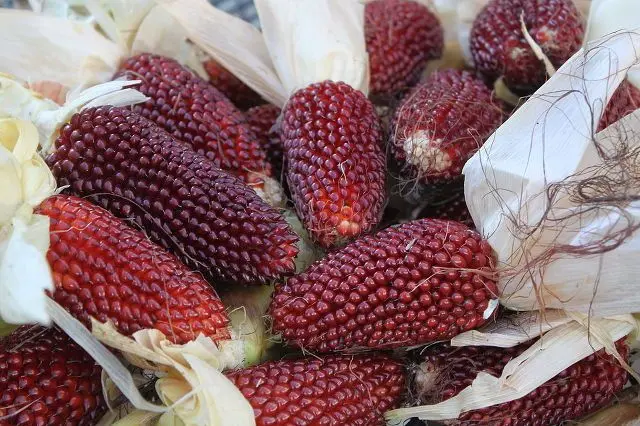
Hotel
Another early variety that can be harvested as early as 80 days after planting. Particularly pleasing to beginner gardeners, as it is drought-resistant, and also rarely lodges. Excellent for growing in dry and hot regions with little rain. Above the previous grade, reaches a height of 2 m. The length of the middle cob is 200 mm. Pearl-like grains have a uniform yellow tint.
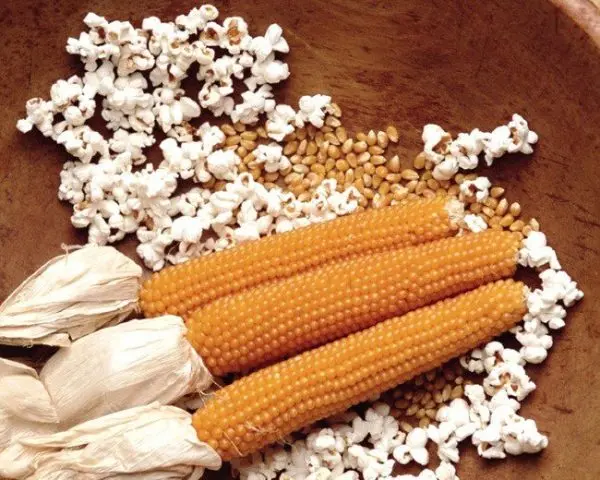
Lopay-Lopay
Mid-early, high-yielding variety of corn for popcorn. Reviews about this variety are extremely positive. Height 130-170 cm, which is lower than most varieties. Cob length 18-21cm. From seedlings to the appearance of the crop and the technical ripeness of the variety, 90-95 days pass. Cobs in the form of a cylinder, large up to 250 g in weight. The grains are yellow, long, wide.
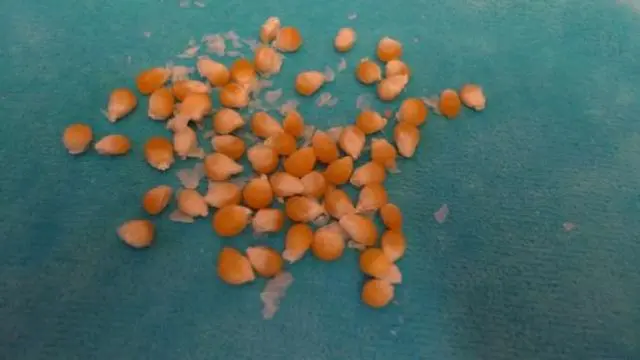
Vulcan
High grade up to 2 m. It has large cobs 20-22 cm long. Grains of corn Volcano outwardly resemble rice, have an even yellow color. It has a unique resistance to temperature extremes, drought and disease. Popcorn lovers note the high parameters of the taste of popcorn from this particular variety of corn. One ear will provide up to 120 g of excellent grains.
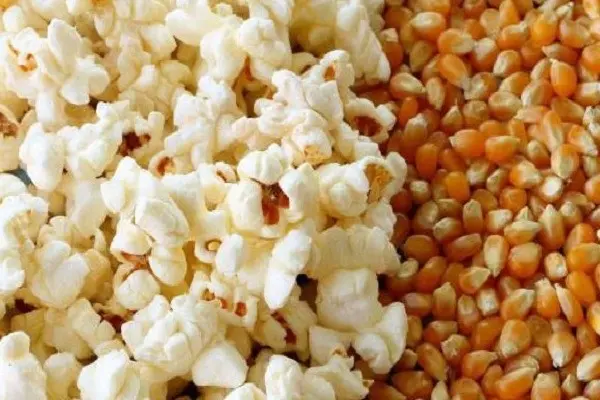
Zeya
The variety has established itself early. It takes 80 days from germination to harvest. The main difference of this variety from others is in the special shape of the grains. They are wide, long and rounded at the top. The color of the grains is burgundy red. The height of the Zeya variety is up to 1,8 m. The size of the cob is 20 cm.
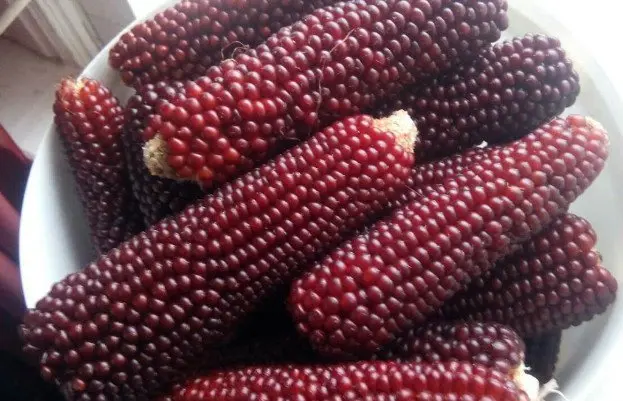
Granddaughter’s joy
Another early variety for popcorn. The period from germination to harvest is 75-80 days. The height of corn is 1,6 m, the size of the cob is only 12 cm. The grains are pale orange in color, small. A rather capricious variety, because it does not like drought and is demanding on the soil. But it is disease resistant.
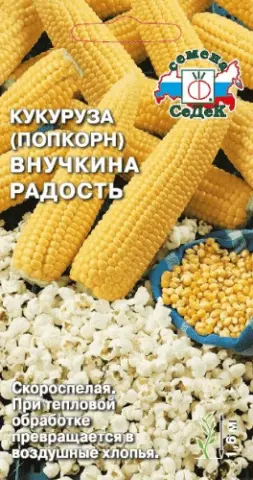
Ping-pong
This is a later specimen that matures for storage about 100 days after germination. The largest cob size for this variety is 15 cm. The grains are small, oblong in shape, and the plant itself is up to 2,2 m high.
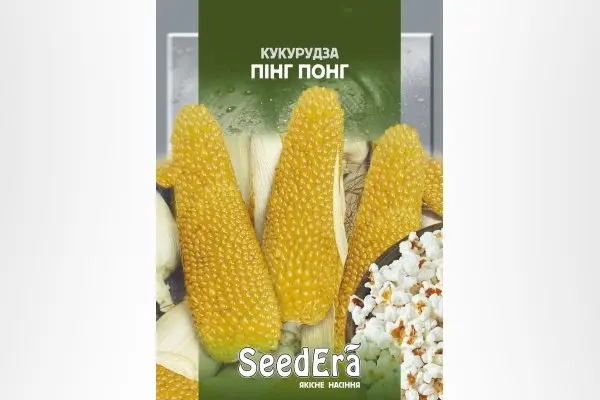
Growing corn for popcorn
Anyone can grow corn for popcorn in their area. But to get a delicious treat, you will have to try in the care and planting of plants. It is not enough just to choose a variety, you also need to grow it and provide all the subtleties of agricultural technology. First of all, it should be taken into account that varieties of corn for popcorn are very thermophilic and are not suitable for growing in the northern regions. However, most of them tolerate drought and heat. It is not enough to properly grow a plant for popcorn, it still needs to be harvested and dried properly.
Landing
When choosing a place to plant popcorn corn, it is necessary to take into account that corn has a strong rhizome. It will easily tolerate heavy soil, but does not get along well on light and sandy soils. The forerunners of corn should be potatoes, tomatoes, as well as early crops.
The optimal time for planting is mid-May. By this time, the threat of return frosts and temperature changes should be completely over.
The day before planting, it is better to apply nitrogen fertilizers to the soil at the rate of 150 g per 10 m2. The soil must be loosened to a depth of 10 cm.
It is recommended to soak the grains before planting. Then they are planted in prepared wells, 1-2 grains in each. The holes should be 50 cm apart. Distance between rows 40-60 cm.
After planting, be sure to water all the wells.
Care
Caring for future popcorn includes several mandatory rules. First of all, you need to monitor the regular watering of the plant. Corn should get a lot of moisture. Water the plant 1-2 times a week. If there is no rain and it is too hot – 3-4 times a week. If it is possible to create a drip irrigation system, then mineral supplements can be added to the water.
Be sure to loosen the soil and remove weeds. In addition, additional top dressing is important for cereals. The yield directly depends on them. The root system of varieties for popcorn is a bit weak in terms of nutrition.
After the appearance of the first 5 true leaves, it is necessary to add urea or liquid organic matter. Before throwing panicles, corn is fed with nitrophoska or azofoska. During the period when the cobs are formed, it is necessary to add potash or nitrogen substances.
Also, pollination is included in the care. Corn is pollinated by the wind, and it needs help only in case of calm weather. It is necessary to shake the plants slightly for pollination to occur.
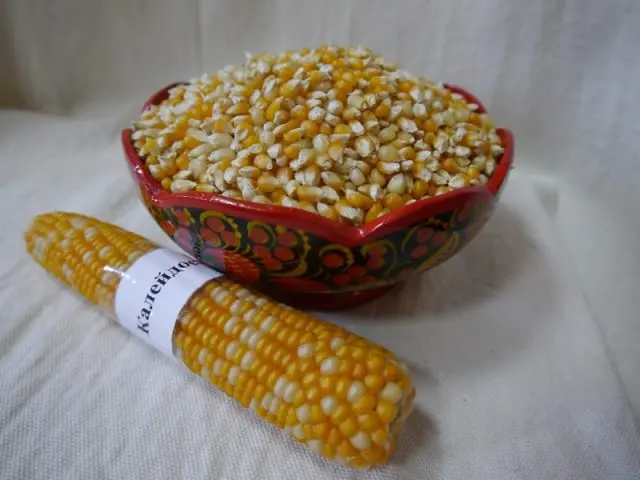
In addition to weeds, there are pests that are also enemies of corn. These include: wireworm, corn borer, swedish fly. As a preventive measure, you should not plant a plant in one place for several years in a row. For treatment, specialized drugs are used.
Harvesting and drying corn for popcorn
Harvesting is one of the most important steps in popcorn production. If the grains are harvested at the stage of milky ripeness, as they do with sweet corn, then they will not be able to explode in a pan. It is important that the grains ripen and even dry directly on the cob. A characteristic external sign of the finished grain is a vitreous shell.
You need to pluck the cobs immediately before laying in storage. You need to collect them right in the “clothes”. After collection, all heads of cabbage lie in a cool and dry place for 30 days. After the end of this period, the raw materials are placed in paper or fabric bags. The best place for storage would be a cellar or balcony.
In overdried grain, there will not be that drop of moisture that is needed for the opening of the grain. Under the storage conditions, popcorn on the cob is stored for 3-4 years without loss of properties.
If the corn is grown, harvested and stored according to all the rules, then the detection rate will be 95% of the total number of grains.
How to make popcorn at home
You can make popcorn at home in the microwave or in a skillet. When using a frying pan, it is necessary to choose the deepest container so that the grains do not pop out during cooking. The cooking algorithm is simple:
- Pour in a tablespoon of sunflower oil.
- Pour the cereal so that it covers the bottom, no more.
- Cover with a lid and wait until the characteristic sounds stop.
- Add salt or caramel to taste.
You can also do it in the microwave. Put the grains in a bowl with a little vegetable oil and cover with a lid. Warm-up time 3-4 minutes.
Conclusion
Corn for popcorn differs from sugar in the content of starch, water and fat. Anyone can grow these varieties. There are some features of agricultural technology, but there are also non-capricious varieties. It is important that grains are stored in a cool, dry place after harvest. Then the ready-made popcorn will be tasty and much more useful than store-bought. Varieties are both early and later. Therefore, it is necessary to choose a variety depending on the desired harvest time. Popcorn cereal requires regular watering and fertilizing with mineral and organic fertilizers.










